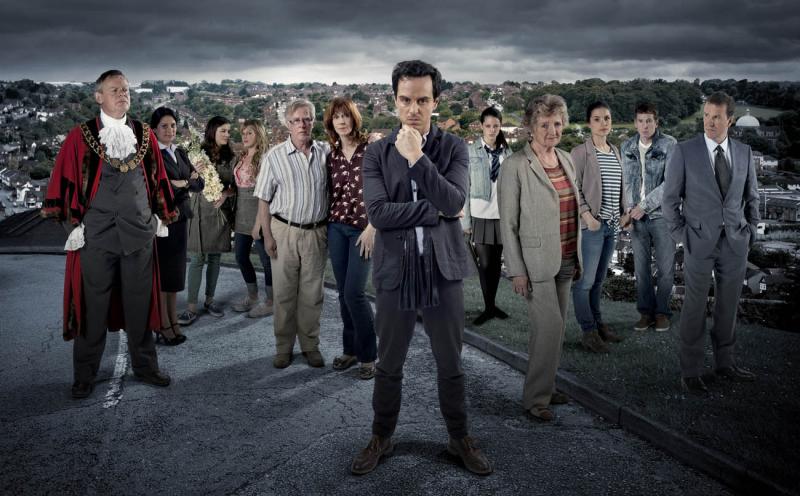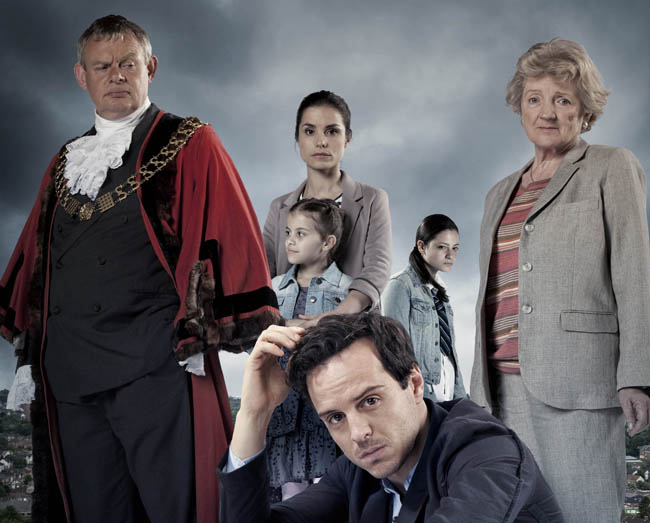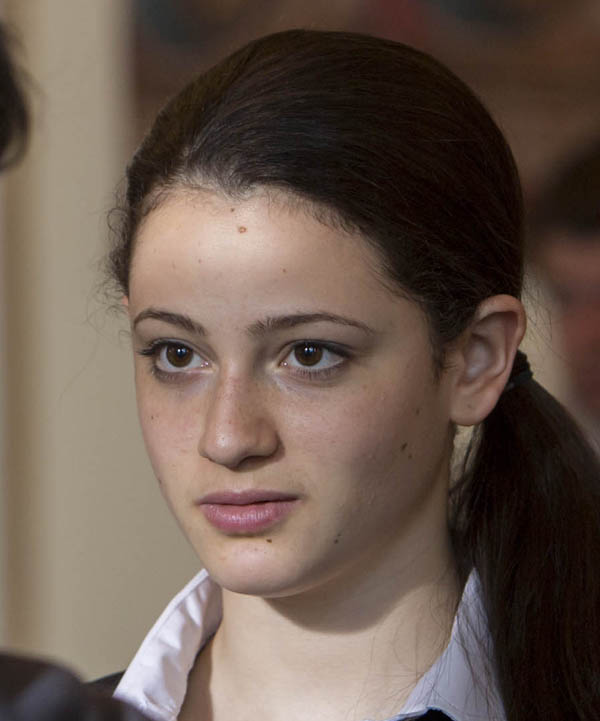The Town, ITV1 | reviews, news & interviews
The Town, ITV1
The Town, ITV1
Strong characters and promising plot deserved more time to develop

Plaudits to ITV for their recent campaign of new drama, even if the results have been patchy. The best ones have been well worth persevering with, and The Bletchley Circle and Tony Marchant's Leaving have wedged themselves most firmly in the mind.
So where does The Town fit in? Well, it would have had a better chance of evolving into something truly memorable if it had been given more than three episodes, and the curse of the short series has become the scourge of British TV drama on whatever channel. Interestingly, the makers of The Killing argue that it's actually cheaper to make longer series, because costs plummet once you've got your cast, crew and sets assembled.
 Meanwhile back at The Town, there was something interesting and unusual about it despite its disappointing brevity. Writer Mike Bartlett (who authored the recent stage adaptation of Chariots of Fire, among other things) successfuly established an air of mystery and disorientation with the opening episode, in which Mark (Andrew Scott) returned to his home town from London following the shocking and inexplicable suicide of his parents. Two of the odder facts about this were that the suicides occurred in the midst of an apparently calm and normal suburban family set-up, and that the dead couple were played by Phil Davis and Siobhan Redmond, who never appeared again after the opening few minutes.
Meanwhile back at The Town, there was something interesting and unusual about it despite its disappointing brevity. Writer Mike Bartlett (who authored the recent stage adaptation of Chariots of Fire, among other things) successfuly established an air of mystery and disorientation with the opening episode, in which Mark (Andrew Scott) returned to his home town from London following the shocking and inexplicable suicide of his parents. Two of the odder facts about this were that the suicides occurred in the midst of an apparently calm and normal suburban family set-up, and that the dead couple were played by Phil Davis and Siobhan Redmond, who never appeared again after the opening few minutes.
Having played Moriarty to Benedict Cumberbatch's Holmes, Scott now took on the sleuthing role. Angry and confused as he was, he was also convinced - out of gut feeling more than any concrete evidence - that there was more to the deaths than met the eye. Murder, in his increasingly agitated view, could not be ruled out. When the investigating policeman, Inspector Franks (an edgy Douglas Hodge), told him he should just bury his parents and get on with his life, his inner thermostat blew a fuse.
As it turned out, he was absolutely right, and as he prised out the murky secrets of his mother's love affair with Franks and his parents' shameful involvement in a hit-and-run accident, he also tore the lid off various strains of unhappiness and dissatisfaction affecting the citizens of the humdrum home town he'd left behind. Mark was vaguely reminiscent of a low-rent Clint Eastwood, wreaking a terrible vengeance in some fly-blown border town, except he didn't have a gun, nobody chewed tobacco and there were magpies instead of vultures circling overhead.
 The ending was too pat and truncated - there was a tell-all confession that suddenly explained everything, and Mark found some equilibrium by getting back with his old girlfriend Alice - but where Bartlett had scored was in the creation of a batch of intriguingly off-kilter characters. Mark's sister Jodie (Avigail Tlalim, pictured left) turned in a convincing portrayal of a teenager afflicted with grief, rage and stampeding hormones, yet still remained likeable in all her volcanic stroppiness. Martin Clunes played Len, the town mayor, like a bullying and bibulous headmaster, with a bit of Boris Johnson for good measure, and it would have been fun to see his eccentricities stretched a bit further in a longer series.
The ending was too pat and truncated - there was a tell-all confession that suddenly explained everything, and Mark found some equilibrium by getting back with his old girlfriend Alice - but where Bartlett had scored was in the creation of a batch of intriguingly off-kilter characters. Mark's sister Jodie (Avigail Tlalim, pictured left) turned in a convincing portrayal of a teenager afflicted with grief, rage and stampeding hormones, yet still remained likeable in all her volcanic stroppiness. Martin Clunes played Len, the town mayor, like a bullying and bibulous headmaster, with a bit of Boris Johnson for good measure, and it would have been fun to see his eccentricities stretched a bit further in a longer series.
Julia McKenzie was rather touching as the dead woman's mother, determined to "keep buggering on" rather than succumbing to grief and depression. As for the pair of ditsy lesbians running a local florist, they were virtually irrelevant to the story, but provided excellent entertainment. The Town will have to go down as a promising idea which didn't get the backing it deserved. We'll be hearing from Mike Bartlett again, though.
Add comment
The future of Arts Journalism
You can stop theartsdesk.com closing!
We urgently need financing to survive. Our fundraising drive has thus far raised £49,000 but we need to reach £100,000 or we will be forced to close. Please contribute here: https://gofund.me/c3f6033d
And if you can forward this information to anyone who might assist, we’d be grateful.

Subscribe to theartsdesk.com
Thank you for continuing to read our work on theartsdesk.com. For unlimited access to every article in its entirety, including our archive of more than 15,000 pieces, we're asking for £5 per month or £40 per year. We feel it's a very good deal, and hope you do too.
To take a subscription now simply click here.
And if you're looking for that extra gift for a friend or family member, why not treat them to a theartsdesk.com gift subscription?
more TV
 Murder Before Evensong, Acorn TV review - death comes to the picturesque village of Champton
The Rev Richard Coles's sleuthing cleric hits the screen
Murder Before Evensong, Acorn TV review - death comes to the picturesque village of Champton
The Rev Richard Coles's sleuthing cleric hits the screen
 Black Rabbit, Netflix review - grime and punishment in New York City
Jude Law and Jason Bateman tread the thin line between love and hate
Black Rabbit, Netflix review - grime and punishment in New York City
Jude Law and Jason Bateman tread the thin line between love and hate
 The Hack, ITV review - plodding anatomy of twin UK scandals
Jack Thorne's skill can't disguise the bagginess of his double-headed material
The Hack, ITV review - plodding anatomy of twin UK scandals
Jack Thorne's skill can't disguise the bagginess of his double-headed material
 Slow Horses, Series 5, Apple TV+ review - terror, trauma and impeccable comic timing
Jackson Lamb's band of MI5 misfits continues to fascinate and amuse
Slow Horses, Series 5, Apple TV+ review - terror, trauma and impeccable comic timing
Jackson Lamb's band of MI5 misfits continues to fascinate and amuse
 Coldwater, ITV1 review - horror and black comedy in the Highlands
Superb cast lights up David Ireland's cunning thriller
Coldwater, ITV1 review - horror and black comedy in the Highlands
Superb cast lights up David Ireland's cunning thriller
 Blu-ray: The Sweeney - Series One
Influential and entertaining 1970s police drama, handsomely restored
Blu-ray: The Sweeney - Series One
Influential and entertaining 1970s police drama, handsomely restored
 I Fought the Law, ITVX review - how an 800-year-old law was challenged and changed
Sheridan Smith's raw performance dominates ITV's new docudrama about injustice
I Fought the Law, ITVX review - how an 800-year-old law was challenged and changed
Sheridan Smith's raw performance dominates ITV's new docudrama about injustice
 The Paper, Sky Max review - a spinoff of the US Office worth waiting 20 years for
Perfectly judged recycling of the original's key elements, with a star turn at its heart
The Paper, Sky Max review - a spinoff of the US Office worth waiting 20 years for
Perfectly judged recycling of the original's key elements, with a star turn at its heart
 The Guest, BBC One review - be careful what you wish for
A terrific Eve Myles stars in addictive Welsh mystery
The Guest, BBC One review - be careful what you wish for
A terrific Eve Myles stars in addictive Welsh mystery
 theartsdesk Q&A: Suranne Jones on 'Hostage', power pants and politics
The star and producer talks about taking on the role of Prime Minister, wearing high heels and living in the public eye
theartsdesk Q&A: Suranne Jones on 'Hostage', power pants and politics
The star and producer talks about taking on the role of Prime Minister, wearing high heels and living in the public eye
 King & Conqueror, BBC One review - not many kicks in 1066
Turgid medieval drama leaves viewers in the dark
King & Conqueror, BBC One review - not many kicks in 1066
Turgid medieval drama leaves viewers in the dark
 Hostage, Netflix review - entente not-too-cordiale
Suranne Jones and Julie Delpy cross swords in confused political drama
Hostage, Netflix review - entente not-too-cordiale
Suranne Jones and Julie Delpy cross swords in confused political drama

Comments
My first thought, during the
The Town was terrible.
I take issue with you
I take issue with you implying that the character is "strong" because she didn't "succumb to grief and depression". First of all, those two are not the same. Secondly, grief is natural and third, for some of us "succumbing" or not to depression is NOT a choice because some of us have endogenic aka biological clinical depression. Bit thanks for stigmatizing this issue once again